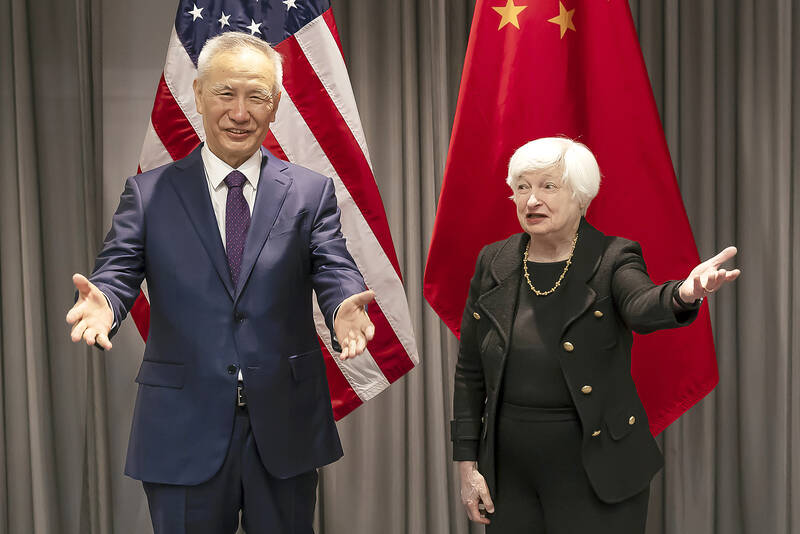Chinese Vice Premier Liu He (劉鶴) and US Secretary of the Treasury Janet Yellen privately discussed points of disagreement during a break from official proceedings in their first in-person meeting, a senior Treasury official said.
The meeting is seen as a sign that the world’s top economies are seeking to downplay tensions and spotlight a constructive tone in their discussions.
Wednesday’s meeting, which was only announced two days earlier, was billed by both delegations as a step toward improving dialogue and an opportunity to exchange views over areas of disagreement.

Photo: AP
The official briefed reporters on the condition of anonymity following the talks in Zurich.
An earlier statement from the Treasury called the discussions “candid, substantive and constructive,” and announced plans for Yellen to visit Beijing later this year.
Liu and Yellen retreated to one end of the room after a coffee break, accompanied only by translators who were largely unneeded due to Liu’s command of English, the official said.
After some time, staff members asked the two whether the formal session should restart, but were rebuffed because the private conversation was going so well, the person added.
Later, when talks between the delegations reached the stage at which grievances were due to be aired, Yellen and Liu told the group that there was no need to do so because they had already addressed all the key issues.
The Treasury official did not reveal details about what had been said during the informal portion of the meeting.
Among the contentious issues that had been expected to come up during the meeting were China’s objections to US export and investment controls. The US has angered Beijing in recent months by seeking to deny China access to advanced semiconductors, a technology China has said is crucial to its economic development.
Other key subjects addressed in the talks were US efforts to cool inflation without triggering a recession, and China’s real-estate crunch, the official said.
The pair also discussed the growing problem of heavily indebted low and middle-income countries. Yellen specifically mentioned Zambia, where she is scheduled to visit later this month, the person said.
Zambia is seen as an important test case for the so-called Common Framework, a program organized by wealthy nations to help debtors simultaneously negotiate with their sovereign and private creditors.
The African country defaulted in 2020 and is seeking to restructure about US$12.8 billion in external debt. About one-third of that is owed to China, which has been criticized for delaying the process.

PATENTS: MediaTek Inc said it would not comment on ongoing legal cases, but does not expect the legal action by Huawei to affect its business operations Smartphone integrated chips designer MediaTek Inc (聯發科) on Friday said that a lawsuit filed by Chinese smartphone brand Huawei Technologies Co (華為) over alleged patent infringements would have little impact on its operations. In an announcement posted on the Taiwan Stock Exchange, MediaTek said that it would not comment on an ongoing legal case. However, the company said that Huawei’s legal action would have little impact on its operations. MediaTek’s statement came after China-based PRIP Research said on Thursday that Huawei filed a lawsuit with a Chinese district court claiming that MediaTek infringed on its patents. The infringement mentioned in the lawsuit likely involved

Taipei is today suspending work, classes and its US$2.4 trillion stock market as Typhoon Gaemi approaches Taiwan with strong winds and heavy rain. The nation is not conducting securities, currency or fixed income trading, statements from its stock and currency exchanges said. Authorities had yesterday issued a warning that the storm could affect people on land and canceled some ship crossings and domestic flights. Taiwan Semiconductor Manufacturing Co (TSMC, 台積電) expects its local chipmaking fabs to maintain normal production, the company said in an e-mailed statement. The main chipmaker for Apple Inc and Nvidia Corp said it has activated routine typhoon alert

GROWTH: TSMC increased its projected revenue growth for this year to more than 25 percent, citing stronger-than-expected demand for AI devices and smartphones The Taiwan Institute of Economic Research (TIER, 台灣經濟研究院) yesterday raised its forecast for Taiwan’s GDP growth this year from 3.29 percent to 3.85 percent, as exports and private investment recovered faster than it predicted three months ago. The Taipei-based think tank also expects that Taiwan would see a 8.19 percent increase in exports this year, better than the 7.55 percent it projected in April, as US technology giants spent more money on artificial intelligence (AI) infrastructure and development. “There will be more AI servers going forward, but it remains to be seen if the momentum would extend to personal computers, smartphones and

Catastrophic computer outages caused by a software update from one company have once again exposed the dangers of global technological dependence on a handful of players, experts said on Friday. A flawed update sent out by the little-known security firm CrowdStrike Holdings Inc brought airlines, TV stations and myriad other aspects of daily life to a standstill. The outages affected companies or individuals that use CrowdStrike on the Microsoft Inc’s Windows platform. When they applied the update, the incompatible software crashed computers into a frozen state known as the “blue screen of death.” “Today CrowdStrike has become a household name, but not in